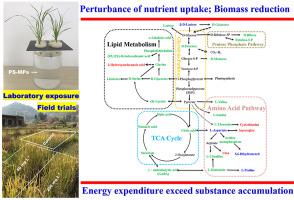Environmental Pollution ( IF 7.6 ) Pub Date : 2020-07-07 , DOI: 10.1016/j.envpol.2020.115159 Xiang Wu 1 , Yao Liu 2 , Shanshan Yin 3 , Keke Xiao 1 , Qiao Xiong 1 , Shijie Bian 1 , Sha Liang 1 , Huijie Hou 1 , Jingping Hu 1 , Jiakuan Yang 4

|
Large amounts of microplastics accumulate in the agricultural soil. Microplastics would stress the crops but the underlying mechanism remains unclear. Herein, a laboratory exposure and field trials were carried out to investigate the response of rice (Oryza sativa L. II You. 900) to stress induced by polystyrene microplastics (PS-MPs) using a metabolomic approach. After laboratory exposure for 21 days, the decreases in shoot biomass of rice exposed to low, medium and high doses of PS-MPs were 13.1% (CV = 4.1%), 18.8% (CV = 3.7%), and 40.3% (CV = 9.2%), respectively, while the antioxidant enzymes showed an inverted upper-U shape when exposed to PS-MPs. A total of 24 samples from three exposure dose levels were included in the metabolic analysis. The metabolites of 12 amino acids, 16 saccharides, 26 organic acids and 17 others (lipids and polyols) in leaves decreased after the exposure to both 50 mg L−1 and 250 mg L−1 PS-MPs doses with hydroponically-cultured. The inhibition of perturbed biological pathway causes the biosynthesis of amino acids, nucleic acids, fatty acids and some secondary metabolites decreased which indicate that the energy expenditure exceeded the substance accumulation. In order to further validate the effects of PS-MPs on rice leaves obtained from the laboratory-scale experiments, a field-trial experiment was conducted. After 142 days of cultivation in farmland, the results with a maximum of 25.9% lower biomass in the crops exposed with PS-MPs. As such, the presence of PS-MPs may affect rice production by altering the metabolic systems of rice. Long-term exposure of PS-MPs to rice might be a potential risk to rice safety and quality.
中文翻译:

代谢组学揭示了水稻(Oryza sativa L.)暴露于聚苯乙烯微塑料的反应。
大量的微塑料积聚在农业土壤中。微塑料会给农作物带来压力,但其潜在机理尚不清楚。在这里,进行了实验室暴露和田间试验以调查水稻(Oryza sativaL. II你。900)使用代谢组学方法承受聚苯乙烯微塑料(PS-MPs)引起的应力。实验室暴露21天后,低,中和高剂量PS-MP暴露的水稻苗生物量下降分别为13.1%(CV = 4.1%),18.8%(CV = 3.7%)和40.3%(CV = 9.2%),而抗氧化剂酶暴露于PS-MPs时呈现倒U型形状。来自三个暴露剂量水平的总共24个样品包括在代谢分析中。暴露于50 mg L -1和250 mg L -1后,叶片中12种氨基酸,16种糖类,26种有机酸和其他17种(脂质和多元醇)的代谢产物均降低PS-MPs水培培养。干扰生物途径的抑制导致氨基酸,核酸,脂肪酸和一些次生代谢产物的生物合成减少,这表明能量消耗超过了物质积累。为了进一步验证PS-MP对实验室规模实验获得的稻叶的影响,进行了田间试验。在农田中耕种142天后,暴露于PS-MP的农作物中的生物量最多降低25.9%。这样,PS-MP的存在可能会通过改变水稻的代谢系统而影响水稻的生产。PS-MP长期接触大米可能会对大米的安全和品质构成潜在风险。











































 京公网安备 11010802027423号
京公网安备 11010802027423号